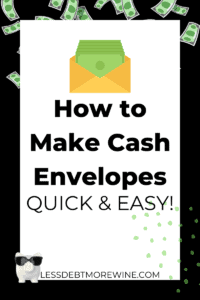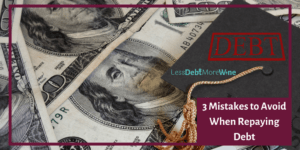Why You Need an Emergency Fund & a Buffer
THIS POST MAY CONTAIN AFFILIATE LINKS. MEANING I RECEIVE COMMISSIONS FOR PURCHASES MADE THROUGH THOSE LINKS, AT NO COST TO YOU. PLEASE READ MY DISCLOSURE FOR MORE INFO.
You can have the greatest budget in the world, but at some point, life is going to throw you a financial curve ball. It might be a parking ticket or a sudden job loss. Either way, you’re going to want a financial safety net to catch those curve balls (it’s possible I’ve muddled my metaphor a bit, moving on).
While a parking ticket is an unexpected expense, it is hardly an emergency. Let me repeat that, an unexpected expense is not necessarily an emergency.
Unexpected expenses pop up all the time and if you treat them all like emergencies you’ll never have enough saved to handle the big emergencies that do pop up. This is why you need both an emergency fund AND a buffer.
What is an Emergency Fund?
An emergency fund is an important way to help protect you and your family from life’s many surprises. It ensures that you have a financial safety net in the case of an emergency. It could be you lost a job; your car got totaled, or an unexpected medical expense showed up. The goal of an emergency fund is to be able to pay the unexpected expenses without going into debt. You don’t want one emergency to be followed by a financial emergency.
How Much Should You Have in Your Emergency Savings?
The time to start an emergency fund is now. Many personal finance experts will recommend saving $1,000 for an emergency fund. While I think $1,000 is a good rule of thumb to start, especially when you’re in debt, in my experience when it rains it pours. I like to be prepared with enough in my emergency fund to cover 3 emergencies.
I suggest you look at the last couple of emergencies you had and average out the cost and then multiply that by three to get your emergency fund goal number.
The size of your emergency fund will also depend on how much you earn, the age of your dependents and whether or not you expect to be in debt. The more people you need to support, the larger your emergency fund should be. Take into account things like pet emergencies and home emergencies too.
How to Save for an Emergency Fund
The advice to put as much of your spending money into an emergency fund is a common one. However, it’s not always the easiest thing to do!
If you’re struggling to save up for an emergency fund or just want a new way to think about savings, consider these tips:
Start by tucking away small amounts of money every day. You’ll notice saving money gets easier when you make it a habit. Slow and steady will win the race.
If you want to see faster growth then consider putting any extra money you earn (maybe from a bonus or pay raise) directly into your emergency fund.
When I started saving for my emergency fun I started with $25 per paycheck, so just $50 per month. As I got better at handling my finances, I started saving more. Eventually, it became $100 saved per paycheck. Including saving extra when I could and encountering a few emergencies over the course of three years, my emergency fund grew to $4k well on it’s way to the $5k goal.
Use a Savings Game to Kickstart Your Emergency Fund
If slow and steady isn’t your thing, you can use a savings game to get started. There are tons of savings games out there, like every time you get a $5 bill you set it aside to save, just save all your $5 bills. I even wrote about how you can easily save over $600 in 5 months never needing to set aside more than $30 in a single day.
Qapital can help you reach savings goals . Once you have the Qapital App installed and a bank account (or in my case three) connected you set up a goal or goals. I currently have two, one to save for taxes #selfemployed and one to save for spending money when I travel hack my way to Paris. Then you set savings rules for each of your goals.
For example, I have a round up to the nearest $2 rule, a guilty spending rule -when I buy Dominos, and a savings rule for every time I hit my step goal with FitBit. There are tons of different savings rules you can set up to best suit you.
Use Chime to Save For You
If you still struggle with setting aside money for savings, then I recommend using Chime to start saving an emergency fund for you. Chime works by starting a spending account (takes 5 minutes) and opting into the automatic savings plan. Every time you use the Chime Debit Card it rounds up your purchase to the nearest dollar and puts in in savings. Right now they also offer a 10% bonus on those savings. All those withdrawals add up over time.
Chime is free to use, with no monthly fees. With Chime , you end up saving money without having to think about it.
When To Use Your Emergency Fund
You don’t have to wait to use your emergency fund for an extreme situation such as being let go from your current job. It can also be used for an illness, car accident or other unexpected event that might disrupt your life and income.
How a Buffer is Different
A buffer is for the unexpected expenses that pop up, the parking ticket, or the dry cleaning from having a drink spilled. While it is wise to keep your emergency fund in a separate but easily accessible account, your buffer stays in your regular checking account.
How Much Should You Have Saved as a Buffer
I like to have $100-$200 a month set aside in my monthly budget as a buffer. Some months I use more of it than others, whatever is left at the end of the month rolls over into the next month’s buffer. But you may also choose to grow your buffer, to ensure you’re never living paycheck to paycheck.
That being said I also know folks that prefer to have a $1k buffer. It really depends on the number of expenses you have each month. I live alone and work from home, so I don’t tend to incur too many unexpected expenses. But that isn’t the case for everybody.
How to Save Up a Buffer
When setting up your budget, set up a “Buffer” line or category. Make sure you are contributing to it each month until you hit that sweet spot. Whatever you don’t use a previous month can be rolled over into the next month. Chime or Qapital could again be great ways to kick-start savings. Just make sure you’re covered no matter what expenses pop up in life.
How to Figure Out Whether You Should Use Your Emergency Fund or Your Buffer
Both emergency funds and buffers are set aside for the unexpected. You should use your emergency fund if it is a one-time event, and you should use your buffer if you anticipate this will reoccur.
A buffer is not an emergency fund because it will not cover all your expenses in the long term. It is designed to help you get through a cyclical event where you know that you have enough money to cover these expenses but need time to replenish your funds before they happen again.
Wrapping it Up with a Bow on Top
You definitely need an emergency fund. However, having a buffer will help you stay on financial track and hit your financial goals faster without always dipping into your emergency fund. Remember, not all unexpected expenses are emergencies.
To make sure you keep your emergency fund funded, it’s best to keep your emergency fund and buffer separated. If you are in debt and can’t imagine being able to save money, use a tool like Chime or Qapital to make it easy and automatic.



